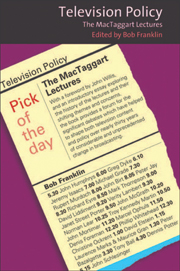Book contents
- Frontmatter
- Contents
- Acknowledgements
- Foreword
- Introduction
- The James MacTaggart Lectures
- TV Drama: The Case against Naturalism
- Naturalism and Television
- Taboos in Television
- Signposting Television in the 1980s: The Fourth Television Channel
- Television Drama, Censorship and the Truth
- The Day after Tomorrow: The Future of Electronic Publishing
- The Primacy of Programmes in the Future of Broadcasting
- Reflections on Working in Film and Television
- ‘Opening up the Fourth Front’: Micro Drama and the Rejection of Naturalism
- Power and Pluralism in Broadcasting
- Ethics, Broadcasting and Change: The French Experience
- Freedom in Broadcasting
- Deregulation and Quality Television
- The Future of Television: Market Forces and Social Values
- The Future of the BBC
- Occupying Powers
- A Culture of Dependency: Power, Politics and Broadcasters
- Talent versus Television
- A Glorious Future: Quality Broadcasting in the Digital Age
- Rewarding Creative Talent: The Struggle of the Independents
- Television versus the People
- Public-Interest Broadcasting: A New Approach
- A Time for Change
- The Soul of British Television
- Television's Creative Deficit
- Freedom of Choice: Public-Service Broadcasting and the BBC
- First Do No Harm
- Appendix A Edinburgh International Television Festival, 29 August–2 September 1977: Programme
- Appendix B Précis of Ted Turner, James MacTaggart Lecture 1982; Dr Jonathan Miller, James MacTaggart Lecture 1983
- Index
The Future of Television: Market Forces and Social Values
from The James MacTaggart Lectures
Published online by Cambridge University Press: 05 August 2013
- Frontmatter
- Contents
- Acknowledgements
- Foreword
- Introduction
- The James MacTaggart Lectures
- TV Drama: The Case against Naturalism
- Naturalism and Television
- Taboos in Television
- Signposting Television in the 1980s: The Fourth Television Channel
- Television Drama, Censorship and the Truth
- The Day after Tomorrow: The Future of Electronic Publishing
- The Primacy of Programmes in the Future of Broadcasting
- Reflections on Working in Film and Television
- ‘Opening up the Fourth Front’: Micro Drama and the Rejection of Naturalism
- Power and Pluralism in Broadcasting
- Ethics, Broadcasting and Change: The French Experience
- Freedom in Broadcasting
- Deregulation and Quality Television
- The Future of Television: Market Forces and Social Values
- The Future of the BBC
- Occupying Powers
- A Culture of Dependency: Power, Politics and Broadcasters
- Talent versus Television
- A Glorious Future: Quality Broadcasting in the Digital Age
- Rewarding Creative Talent: The Struggle of the Independents
- Television versus the People
- Public-Interest Broadcasting: A New Approach
- A Time for Change
- The Soul of British Television
- Television's Creative Deficit
- Freedom of Choice: Public-Service Broadcasting and the BBC
- First Do No Harm
- Appendix A Edinburgh International Television Festival, 29 August–2 September 1977: Programme
- Appendix B Précis of Ted Turner, James MacTaggart Lecture 1982; Dr Jonathan Miller, James MacTaggart Lecture 1983
- Index
Summary
David Elstein's concern is to explore the Thatcher legacy to broadcasting which, he argues, is characterised by a shift away from social values to market forces as the key engines driving broadcasting. The Peacock Committee initiated this ‘sea-change’ by introducing notions such as consumer sovereignty and competition into programming considerations. Significantly, the Peacock Committee exceeded its brief by largely ignoring the BBC, while proposing ‘the groundwork for a powerful attack on ITV’.
Elstein argues that the 1988 White Paper (Broadcasting in the 1990s: Competition, Choice and Quality) and the subsequent Broadcasting Act 1990, with their requirements for the allocation of ITV franchises by auction, the financial restructuring and sale of ITN, the separation of Channel 4 from ITV and the creation of Channel 5, will have damaging effects on the commercial sector of broadcasting and lead to the ‘demise of those high-cost, high-quality programmes like Poirot [and] Who Bombed Birmingham?’
Elstein concludes that only the BBC is ‘currently immune to these commercial pressures’ but he queries ‘will it remain so?’ He suggests the licence fee will continue to provide funding for the BBC although his preference is for subscription, which he argues provides ‘the safest, most socially equitable, most politically insulated form of funding the BBC’.
- Type
- Chapter
- Information
- Television PolicyThe MacTaggart Lectures, pp. 147 - 156Publisher: Edinburgh University PressPrint publication year: 2005



